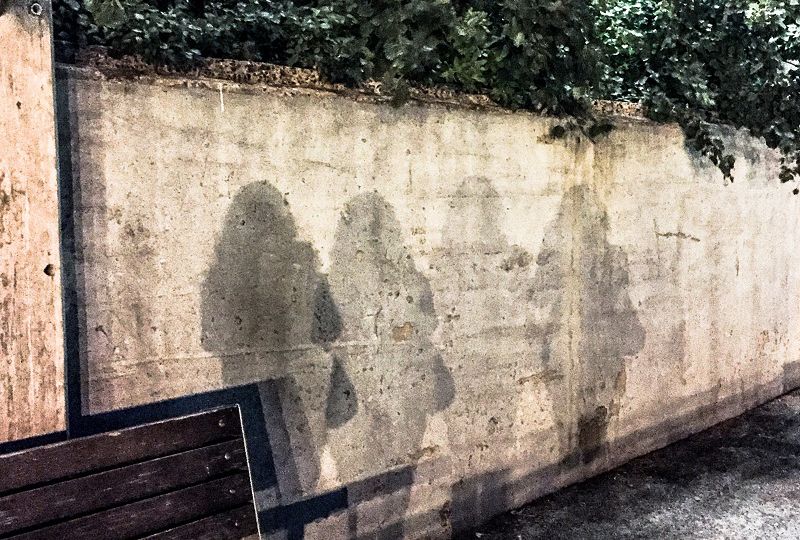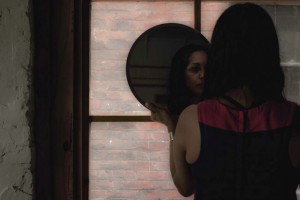
I was nineteen and had just returned to London from a whirlwind, six-week visit to Cuba. While there, I contracted a mild stomach bug for which I received stellar treatment, the symptoms seeming to disappear after a dose of antibiotics. Beset for a few weeks upon my return home to London by mysterious and occasionally debilitating stomach pains, a swollen belly and compromised appetite, I realized it was time to seek medical help again. After a particularly acute attack of stomach pains one evening, my mom and I determined it would be better to seek attention at the hospital than wait to see my general practitioner. We headed to the one nearest to home and, after giving details to the brusque but efficient staff at the front desk, I was promptly ushered into the nurses’ office for a pre-exam.
The nurse looked me up and down and asked about my last period. I responded that it had been recent and regular and that I wasn’t there about a reproductive issue but rather a potential stomach bug. “Mmm hmmm,” she responded, with more than a hint of dubiousness in her voice, and said, “Take this cup, pee into it and bring it back to me. We’ll run a pregnancy test.” I stared back at her. “I’m not pregnant!” She responded, “Well, we’ll see about that. Is that your mum outside? Young girls like you are always coming in like this.”
I was stunned, though in hindsight I don’t know why. I should have been inured to this kind of treatment. I knew what “young girls like you” meant. I’d heard it in various iterations, from the headmistress of my primary school scolding me for eating with my hands because “we don’t do that in this country”, to the number of times I had witnessed my mother being spoken down to by employers and school administration because she didn’t reflect the dominant culture’s image of your average woman (read: she often wore traditional clothes, was multi-lingual, and spoke softly until her buttons were pushed), to the consistent way determinations were made about my family based on our ethnicity, I knew what it was code for.
Presuming, based on my ethnic heritage and age, that I must be one of the apparent stream of young sub-continental women visiting the hospital because they didn’t understand that they might be pregnant – the clear subtext being that sub-continental women are all straight, all predisposed to unknown/unwanted pregnancies and all scared of their own bodies (certainly a genuine issue but by no means an endemic one) – the nurse had magically diagnosed my health issue. Never mind that I hadn’t even been sexually active… But why let facts get in the way of well-formed biases? I pissed in the cup as instructed, fuming but certain that the result would be negative – which it was – and said no more until I was able to speak to a doctor. Said doctor determined after examination that I most likely had a case of intestinal parasites, a diagnosis confirmed after further tests. When I challenged the doctor on the nurse’s attitude, I was told that she was just doing her job.
As an ‘ethnic minority’ kid, born and raised in West London to Punjabi immigrants, I had withstood my fair share of random and sometimes not-so-random pedestrian racism and prejudice. If I had a pound for every time I was called a Paki and told to go back to where I had come from, I might not be a rich woman but I’d have more than a few quid! Discrimination or, to be more precise, ‘othering’ has a different feeling-tone and impact when delivered by the state or agents of the state in whose hands such behaviour and treatment soon become institutional practice. In such a context, asserting oneself as an individual with agency, with an awareness of self, and not just an invisible member of an oft-misunderstood – nay, actively misrepresented – population becomes a gargantuan task. It’s one that you don’t even realise you’re dealing with until you interact with those who don’t carry this stressor upon their shoulders.
My work as a qualitative researcher with grassroots organisations in the U.S. (which I now call home) as well as in the U.K. has helped me understand just how widespread this kind of societal alienation can be for those of us who occupy the ‘third space’. Ethnic minorities – particularly, visible ones – are defined in the context of the norms of the dominant culture. Everything, and everyone, outside of those norms is ‘othered’, relegated to the margins of that construct (much like sexuality; just as the binary doesn’t work there, it doesn’t work elsewhere either.)
The incident at the hospital and others like it have made me very leery of seeking help at an institutional level. Whether it has been my hesitation to disclose a history of sexual abuse lest it be used to further cement stereotypes about the innate barbarity of men of colour, to thinking twice before seeking reproductive healthcare (would I be seen and heard by the medical establishment, or would presumptions be made about me based on my identity – naive Brown woman predisposed to certain behaviours?), I have an innate distrust of ‘the system’ of which I feel perpetually on the margins. It’s enough that medical communities from London to Vladivostok treat women like objects, unable to make decisions in the best interests of our own health and clueless about our own bodies. Add to the mix race, class and immigration status and you find that there are additional layers to this ‘othering’ for those in the ‘third space’.
This was brought home to me most recently by the astonishing case of Purvi Patel. After suffering a miscarriage and seeking medical assistance at her local hospital in the U.S. state of Indiana, Purvi was arrested and later sentenced to twenty years in prison for foeticide and neglect of a dependent, two ostensibly conflicting charges. It was a landmark case, following on the heels of another, involving Bei Bei Shuai a Chinese immigrant to the U.S. who was charged with murder and attempted foeticide after her failed suicide attempt allegedly resulted in the death of the child she was pregnant with (the doctors performed a Caesarian but the baby lived only two days). Critics suggested that jurors in both cases were influenced by stereotypes “that Asian-American women make poor reproductive choices because of cultural norms”, aka “young girls like you.”
As these cases illustrate, occupying the ‘third space’ can be treacherous. How does one navigate the hazards of these spaces?
I don’t have a one-size-fits-all answer. In living in this space, in collaborating, associating, sharing experiences with others in the same situation, as well as those perceived to be part of the dominant culture, it is clear that ‘normal is just a setting on the dryer’. As I delve more deeply in my personal research on home and identity, I realise that the same systems that serve to confine and repress sexual minorities are at play with those of us who similarly aren’t perceived to conform or adhere to the norms of the dominant culture. When looked at more deeply and in the context of our rapidly changing and increasingly interconnected world, dominant culture can be revealed for the lie that it is: fed to the masses to placate and control us.
Knowing this doesn’t erase the challenges associated with dealing with material reality but it does start to provide an opening into the psycho-spiritual realm. I continue to resist ‘the system’ in subtle ways but I am increasingly aware that to be ‘in’ it doesn’t necessarily mean I need to identify with being ‘of’ it. I need not allow myself to be shoved into a false binary: performing to please the dominant culture (what our Black cousins refer to as bowing to the White Gaze) or ‘returning’ to some anachronistic caricature of my culture of origin as a kind of petulant counter-reaction.
In our increasingly heterogeneous world, one where we are being invited (by way of alienation) to expand our sense and expression of self, there’s little use in trying to ‘fit in’. I mean not to negate the fact that occupying non-traditional spaces, or those sanctioned by the powers that be, comes with material dangers. But it seems we are damned either way. Best to be the most authentic, individuated version of “young girls like you” that we can be. And on this journey to realising our truest selves, we might try to engage more consciously with the diverse stories of all the unnamed and unknown, oft-ignored “young girls like you”, the other Purvi Patels and Bei Bei Shuais of the world. We might try to remember that they are individual souls inhabiting individual bodies on their own individual journeys in this mad game called life.
The images used with this article are courtesy of the author.
